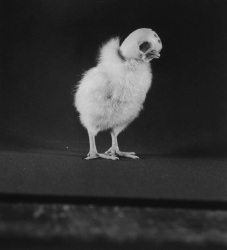Science
Knitted Dissections
You'll surely want to pick up the knitting patterns to reproduce these creations, to be found at the Etsy site.
Posted By: Paul - Fri Dec 05, 2008 -
Comments (5)
Category: Animals, Crafts, Death, Science
How much heat can the body withstand?
 In 1948 Dr. Craig Taylor at the University of California at Los Angeles created a heat chamber to determine the human tolerance for extreme heat. He experimented on himself. In the picture (from the Life archive) you can see him sitting in his hotbox, heated to a pleasant 220° fahrenheit. The egg on the metal pan in front of him was frying. The highest temperature he ever endured was 262°.
In 1948 Dr. Craig Taylor at the University of California at Los Angeles created a heat chamber to determine the human tolerance for extreme heat. He experimented on himself. In the picture (from the Life archive) you can see him sitting in his hotbox, heated to a pleasant 220° fahrenheit. The egg on the metal pan in front of him was frying. The highest temperature he ever endured was 262°.There was a practical point to this. He was trying to determine the maximum heat a fighter pilot could withstand, should the refrigeration system in their plane fail.
For more info about Dr. Taylor's heat experiments, check out the old article from Popular Science posted on the Modern Mechanix blog.
Posted By: Alex - Tue Dec 02, 2008 -
Comments (15)
Category: Science, Experiments, 1940s
The Mechanics of Stabbing
In a paper recently submitted to arXiv.org, researchers describe an attempt to determine the exact amount of force required to stab someone. No, they didn't stab real people. They stabbed synthetic materials such as polyurethane, foam, and ballistic soap. But oddly, no one had previously determined the exact amount of force needed for stabbing. Forensic scientists had simply used qualitative terms such as "mild force" or "severe force".Some of their findings: 1) The best household knife to stab someone with is a utility knife:
2) However, not all knives are created equal. Even two identical knives by the same manufacturer can vary greatly in sharpness and ability to penetrate skin:
the penetration forces associated with nominally identical knives, even virgin knives, can vary by as much as 100%.
Posted By: Alex - Mon Dec 01, 2008 -
Comments (7)
Category: Science, Experiments
Bernie Krause
The musician Bernie Krause has had an arguably weird and fascinating career. He's gone from being a minor pop star to being a scientist in the field of bio-acoustics, or the noises of the natural world. Along the way he came up with the concept of "biophony," short for the biological symphony that each ecosystem makes.The first clip below shows him at work, while the second is a trailer for his concepts.
Posted By: Paul - Sat Nov 29, 2008 -
Comments (1)
Category: Music, Nature, Science
LIFE Photo Archive
Google recently announced it's struck a deal to host the entire photo archive of Life magazine. Millions of photos (including many previously unpublished ones) will be made freely searchable online. If you're the kind of person who likes to browse through archives searching for weird stuff, it's pretty much a goldmine.Only about 20% of the archive is online so far, but I've already had fun browsing through it. Below are a few photos I found doing a search for bird experiments.
The LIFE captions are pretty dry. I thought they could be improved by coming up with new captions in the style of LOL Birds. I'm sure the WU readers can come up with better captions than I was able to.
 |  |

My caption: "I'm watching you!"

My caption: "Canz I play too?"
Posted By: Alex - Wed Nov 19, 2008 -
Comments (5)
Category: Photography and Photographers, Science, Experiments
Shrimp on a Treadmill
Scientific researchers placed a shrimp on a shrimp-size treadmill in order to measure its speed and endurance. This information, they say, "will give us a better idea of how marine animals can perform in their native habitat when faced with increasing pathogens and immunological challenges." Luckily for us, they videotaped the experiment.The video has become hugely popular on the internet, spawning numerous remixes. For instance, witness Shrimp Jamming to Muzak:
There are so many of these remixes you could probably spend an entire day watching them.
Posted By: Alex - Tue Nov 11, 2008 -
Comments (8)
Category: Animals, Nature, Science, Experiments, Video
Fonzarelli Syndrome

While foot dystonia is a common feature in late Parkinson disease (PD), dystonia may precede the development of PD by several years. Writer's cramp has been described as an early manifestation, with extension of the great toe also noted (the striatal foot).
Posted By: Alex - Thu Nov 06, 2008 -
Comments (19)
Category: Medicine, Science, Television
Guess the Scientist, #3
What famous sixteenth-century scientist does this passage describe? Answer is in extended (and in the comments)._________ relates in one of his autobiographies (he wrote three) that he was completely impotent from the age of twenty-one until his marriage at the age of thirty-one; but that after he wed, the union resulted in three children, two boys and a girl...
_________ also suffered from an amazing array of physical problems and ailments, including: stuttering; chronic hoarseness; nasal discharge; heart palpitations; hemorrhoids; indigestion; malaria; gout; chronic itching; hernia; colic; insomnia; dysentery; and a malignant growth on his left nipple. He also had some truly odd physical problems. He wrote that "in 1536 I was overtaken with an extraordinary discharge of urine; and although for nearly forty years I have been afflicted with this trouble, giving from sixty to a hundred ounces a day, I live well."
More in extended >>
Posted By: Alex - Mon Nov 03, 2008 -
Comments (3)
Category: Quizzes, Guess the Scientist, Science
Bjork and Her Television
I really think the beloved and utterly unique Bjork should be the official spokesgal for WEIRD UNIVERSE.
Posted By: Paul - Tue Oct 21, 2008 -
Comments (5)
Category: Aliens, Science, Television, Foreign Customs
Guess the Scientist, #2
What scientist wrote the following passage? The answer is in extended (and on the comments page).A small experimental room was fitted with a bed and other items conducive to a normal sexual response. The bed was placed directly against a wall through which an opening was made. Both sides of the opening were covered with a thick sheet of foam rubber. Slits were made in the foam rubber so that the leads to the instruments could be passed to the recording room while still maintaining the privacy of the experimental room. All of the subjects were married and were between the ages of 22 and 30.
To record the heart rate four electrocardiographic leads, fashioned from wire mesh attached to an elastic bandage, were fastened to the upper thighs and the upper arms. With this technique the ECG was readable even during the periods of greatest muscular activity. During foreplay, records were taken each minute on two Sanborn direct writing electrocardiographs. During coitus continuous recordings were made, and after withdrawal records were again made a 1-minute intervals. Three tests were performed on each of three couples.
More in extended >>
Posted By: Alex - Mon Oct 20, 2008 -
Comments (9)
Category: Quizzes, Guess the Scientist, Science, Experiments

| Who We Are |
|---|
| Alex Boese Alex is the creator and curator of the Museum of Hoaxes. He's also the author of various weird, non-fiction, science-themed books such as Elephants on Acid and Psychedelic Apes. Paul Di Filippo Paul has been paid to put weird ideas into fictional form for over thirty years, in his career as a noted science fiction writer. He has recently begun blogging on many curious topics with three fellow writers at The Inferior 4+1. Contact Us |






